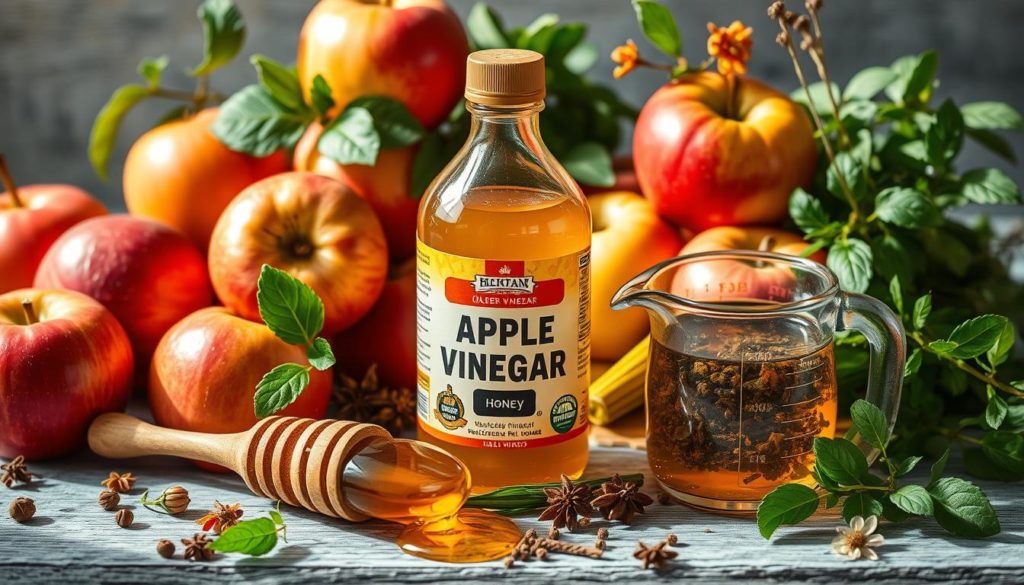Did you know that in the U.S., apple cider vinegar sales soared past $150 million recently? Many people praise its benefits. Yet, it’s also caught up in myths that can lead you astray. This piece aims to clear up those myths and spotlight the true benefits and uses of apple cider vinegar.
It’s believed to boost digestion and even help with weight loss. We’ll tackle the myths about apple cider vinegar head-on. Our exploration uses science to give you a clear picture of this widely used but often misunderstood product.
Understanding the Basics of Apple Cider Vinegar
What is apple cider vinegar and why is it good for you? Let’s look into this versatile liquid used for many years. Apple cider vinegar, or ACV, comes from crushed apples that are fermented.

First, the apples’ sugars turn to alcohol thanks to yeast and bacteria. This is known as the first fermentation. Then, the alcohol becomes acetic acid. This change gives ACV its sour taste and strong smell.
ACV isn’t just acetic acid. It’s packed with essential vitamins and minerals. These nutrients make it very beneficial for your health. The main ones are:
- Acetic Acid
- Vitamins (B1, B2, B6, and C)
- Trace Minerals (Potassium, Magnesium, and Iron)
ACV has been used since ancient Greece and Egypt. It was used to keep food fresh and to treat various health issues. Knowing about apple cider vinegar helps us understand its lasting popularity for cooking and health.
| Component | Health Benefit |
|---|---|
| Acetic Acid | Kills harmful bacteria, supports weight loss |
| Vitamins | Boosts immunity, improves skin health |
| Trace Minerals | Supports heart health, enhances energy levels |
Learning about apple cider vinegar gives us a basis to explore how it can be used and its benefits. Understanding its components lets us see why this old remedy is still valuable today.
Common Myths About Apple Cider Vinegar
Many think of apple cider vinegar (ACV) as a cure-all. But it’s important to tell reality from myth. Here’s the truth behind the common apple cider vinegar stories.

Myth: Apple Cider Vinegar Can Cure All Ailments
Some say apple cider vinegar fixes everything. It’s true that ACV can help with digestion and maybe blood sugar. But it’s not a cure-all. While some benefits are backed by science, it’s wrong to see ACV as a universal solution.
Myth: Drinking Apple Cider Vinegar Guarantees Weight Loss
Another myth is that ACV makes you lose weight instantly. Real talk: weight loss claims about ACV are often too good to be true. It can help you feel full but don’t skip a healthy diet and exercise. Think of ACV as a helpful extra, not the main answer to weight loss.
Myth: All Apple Cider Vinegar Varieties Are the Same
Not all apple cider vinegars are created equal. Different types offer different benefits. For example, raw, unfiltered ACV has the “mother,” packed with good bacteria and enzymes. Filtered ones miss out on these. Plus, organic ACV means no harmful chemicals. So choosing the right kind can really improve its health benefits.
| Type | Features |
|---|---|
| Raw, Unfiltered ACV | Contains “mother,” rich in enzymes and beneficial bacteria |
| Filtered ACV | Free of “mother,” lacks some health benefits |
| Organic ACV | Free from synthetic chemicals and pesticides |
Health Benefits of Apple Cider Vinegar
Apple cider vinegar (ACV) is known for its health benefits. Let’s look at how it can help us stay healthy.
Boosts Digestion
ACV aids digestion by increasing enzyme production. It also lessens acid reflux symptoms. Its acetic acid breaks down food, making digestion easier.
Taking a little apple cider vinegar before meals can improve your digestion.
Supports Heart Health
ACV is good for your heart. It can lower bad cholesterol (LDL) while boosting good cholesterol (HDL). This can improve heart health.
Eating a balanced diet and using ACV regularly can help your heart stay healthy.
Helps Regulate Blood Sugar Levels
ACV also helps control blood sugar levels. It makes insulin work better and lowers blood sugar spikes after eating. This is great for managing diabetes or keeping blood sugar stable.
The Role of Organic Apple Cider Vinegar
Organic apple cider vinegar and its non-organic counterpart differ mainly in how they’re made and their health effects. Knowing these differences helps people make better choices.
Organic vs. Non-organic
Organic apple cider vinegar is made from apples grown without synthetic chemicals. It’s usually not filtered and keeps the “mother” – a mix of enzymes, proteins, and good bacteria. On the other hand, non-organic vinegar is often filtered and heated, losing some of its health benefits.
| Aspect | Organic ACV | Non-organic ACV |
|---|---|---|
| Production | Made from organically grown apples | Made from conventionally grown apples |
| Filtration | Usually unfiltered, includes the “mother” | Filtered, often pasteurized |
| Chemicals | Free from synthetic pesticides and fertilizers | May contain residues from synthetic chemicals |
Why Organic May Be Better
Choosing organic apple cider vinegar has several benefits. It’s free from harmful synthetic chemicals, reducing toxin exposure. Plus, the “mother” in organic ACV boosts gut health with its probiotics and enzymes. These qualities make organic vinegar a preferred choice for those focusing on their health.
Exploring Popular Apple Cider Vinegar Recipes
Apple cider vinegar, or ACV, can make your diet both tasty and healthy. You can improve digestion with an ACV detox drink or add zest to salads. Here’s a list of recipes to kickstart your wellbeing journey.
Apple Cider Vinegar Detox Drink
The ACV detox drink is known for its good health effects. It supports digestion and detox. Follow this easy recipe to try it:
- 1-2 tablespoons of apple cider vinegar
- 1 tablespoon of fresh lemon juice
- 1-2 tablespoons of honey
- 8 ounces of warm water
Blend all the ingredients until they’re fully mixed. Enjoy this drink in the morning or before meals to aid your digestion.
Salad Dressings with Apple Cider Vinegar
Make your salads tastier with these apple cider vinegar salad dressing recipes:
- Simple Vinaigrette
- 1/4 cup of apple cider vinegar
- 3/4 cup of olive oil
- 1 teaspoon of Dijon mustard
- Salt and pepper to taste
Whisk everything until it’s well mixed.
- Honey Mustard Dressing
- 1/4 cup of apple cider vinegar
- 1/2 cup of olive oil
- 1-2 tablespoons of honey
- 1 teaspoon of Dijon mustard
- Salt and pepper to taste
Mix them well for a dressing that’s both sweet and tangy.
With these ACV recipes, you can enjoy flavorful dishes and get health perks. They bring a rich taste to your meals every day.
Does Apple Cider Vinegar Aid in Weight Loss?
Many people are curious about apple cider vinegar and weight loss. This part explains what science says about it. Studies have looked into how an ACV diet might help with weight.
One study showed apple cider vinegar can make you feel fuller. This means you eat less calories. Eating less helps with losing weight, especially with a healthy diet.
Another point is how apple cider vinegar affects fat storage. It might change how our bodies store fat. But, you need to keep taking it for a while to see any change.
It’s also said that apple cider vinegar speeds up your metabolic rate. This could help you burn calories faster. It’s an added benefit for dropping weight.
Here’s a quick look at the findings:
| Aspect | Study Results |
|---|---|
| Appetite | Reduced calorie intake due to increased satiety |
| Fat Storage | Potential reduction in body fat percentage |
| Metabolic Rate | Enhanced calorie burning |
In the end, apple cider vinegar might help with weight control. But it’s not a magic fix. Using it as part of a balanced diet could be helpful.
Versatile Uses of Apple Cider Vinegar Beyond the Kitchen
Apple cider vinegar isn’t just for cooking. It’s a powerful tool for cleaning and gardening too. It changes how we care for our homes and gardens.
Cleaning and Disinfecting
Apple cider vinegar makes a great cleaning solution. Its antibacterial qualities make it a safe, green cleaner. Just mix it with water. You can clean many surfaces with it to get rid of germs.
As a Natural Weed Killer
Gardeners love apple cider vinegar as a safe weed killer. It’s non-toxic and earth-friendly. Mix it with some dish soap. You get a strong weed killer for your garden.
| Base Ingredient | Additive | Usage |
|---|---|---|
| Apple Cider Vinegar | Dish Soap | Natural Weed Killer |
| Apple Cider Vinegar | Water | Household Cleaner |
Using apple cider vinegar for cleaning and gardening is good for the environment. It shows the wide range of uses this amazing substance has.
The Benefits of Using Raw Apple Cider Vinegar
Raw apple cider vinegar, also known as ACV, is not just a simple condiment. It’s packed with health perks. Its raw, unfiltered form preserves the “mother.” This consists of beneficial proteins, enzymes, and bacteria.
Nutritional Advantages
The nutritional benefits of ACV shine in its raw version. The “mother” in it is full of nutrients that vanish in filtered vinegars. These nutrients include:
- Probiotics, which support gut health and digestion
- Enzymes that aid in nutrient absorption
- Essential acids that contribute to detoxification
Increased Potency
The potency of ACV is much stronger when it’s raw. The acetic acid, which it contains more of, offers many benefits, such as:
- Improved digestion and less bloating
- Better metabolism and enhanced fat burning
- Better control over blood sugar
Adding raw apple cider vinegar to your diet boosts these benefits. It’s a key ingredient for those who care about their health.
| Raw Apple Cider Vinegar | Filtered Apple Cider Vinegar |
|---|---|
| Contains the “mother” | Does not contain the “mother” |
| Rich in probiotics and enzymes | Lacks beneficial bacteria and nutrients |
| Higher potency | Less potent |
Apple Cider Vinegar for Skin Care: Myths Vs. Reality
Many people are talking about apple cider vinegar for skin care. They believe it can do things like clear acne or lessen wrinkles. However, we need to look at scientific evidence to know what’s true. Studies give us a clear picture of what apple cider vinegar can and can’t do for our skin.
The use of apple cider vinegar for skin might help with minor issues, but it’s crucial to understand it’s not a cure-all solution.
Now, let’s tackle some myths:
- Myth: Apple cider vinegar can cure acne completely.
- Reality: ACV has antibacterial properties that may help reduce acne, but overuse can lead to skin irritation. Always dilute it before application.
- Myth: Apple cider vinegar eliminates wrinkles.
- Reality: While ACV has some astringent effects, it’s not proven to reduce wrinkles. A comprehensive skincare routine is more effective.
- Always dilute apple cider vinegar before applying it to the skin. Mix one part ACV with four parts water.
- Use a patch test to ensure you don’t have an adverse reaction.
- Incorporate ACV into other skincare products, like masks or toners.
Using apple cider vinegar for your skin care is a smart move, but you need the right approach. Understanding the science helps you make the most of ACV skin care. Safely enjoy its possible benefits in your routine.
How to Safely Incorporate Apple Cider Vinegar into Your Diet
Using apple cider vinegar safely means adding it to your diet the right way. Understand the recommended amounts and best practices first.
Begin by mixing apple cider vinegar with water before drinking. Use one to two tablespoons of ACV in a big glass of water. This makes the vinegar easier to drink and saves your throat and stomach from harm.
Drinking too much ACV can harm tooth enamel and lower potassium levels. Stick to the advised amounts. Using ACV in salads or meat marinades is a balanced approach.
To add ACV to drinks, try a detox mixture. Combine one to two tablespoons of ACV with water, honey for taste, and a bit of cayenne pepper. Enjoy this drink in moderation to get ACV’s potential perks.
Research shows ACV might help with weight loss and blood sugar. But, the research isn’t conclusive. For more, see this article on apple cider vinegar.
In summary, use apple cider vinegar safely by following dosage guidelines and diluting it. Talk to a healthcare provider before making significant diet changes. This is especially true if you have health issues or take medicines. Doing so lets you benefit from ACV without risks.
Conclusion: Sorting Myths from Facts About Apple Cider Vinegar
Apple Cider Vinegar, or ACV, comes with lots of myths and truths. Our journey showed us the real story behind this popular vinegar. It’s not a magic fix but has real benefits that are backed by science.
ACV can help with digestion and might be good for your heart and blood sugar. But it’s not a cure-all. Using organic, raw ACV can make these benefits even stronger. Yet, for losing weight, the evidence isn’t clear, so take it easy.
Beyond cooking, ACV is great for cleaning and even killing weeds. It’s important to know the facts from the false claims. It isn’t a miracle solution, but it does have real uses. Be smart about how you use it in your diet and life. For those interested in how smells affect us, this research offers cool insights. It shows how complex natural remedies and their impacts can be.
To wrap up, ACV is useful but not miraculous. Thinking critically lets us find its true value. Understanding ACV helps us avoid myths and focus on what’s scientifically proven. This wise approach leads to a healthier way of including ACV in our routines.
FAQ
What are the benefits of apple cider vinegar?
Apple cider vinegar, or ACV, offers many health perks. These include better digestion and heart health. It can also manage blood sugar levels. ACV is in weight loss plans and skin care, thanks to acetic acid and key nutrients.
Is organic apple cider vinegar better than non-organic?
Yes, opting for organic ACV is often suggested. It’s usually free from harmful chemicals and preservatives. This type keeps more beneficial elements, like the “mother.” This part is rich in proteins, enzymes, and good bacteria.
Can apple cider vinegar really help with weight loss?
Some research shows ACV might aid in losing weight by boosting metabolism and lessening hunger. But, it’s not a quick fix. To see results, include ACV in a healthy diet and keep active.
What are some popular apple cider vinegar recipes?
You can use ACV in many recipes. Try it in detox drinks and as a salad dressing ingredient. Mix ACV with water, lemon, and a bit of honey for a detox drink. Or mix it with olive oil, Dijon mustard, and herbs for a tasty salad dressing.
How does apple cider vinegar help digestion?
ACV boosts your stomach’s acid production, leading to better food breakdown. It’s packed with enzymes that help your body absorb nutrients. This might relieve acid reflux and indigestion.
Are there any myths about apple cider vinegar?
Indeed, a common myth is that ACV can fix all health issues, which is false. Another wrong belief is that it ensures weight loss all on its own. It’s vital to know ACV aids in health, but it’s not a magic cure.
Can apple cider vinegar help with skin care?
ACV is a common choice for tackling acne, adjusting skin pH, and as a facial toner. Always dilute it and test on a small skin area first. Its acidity might be too strong for certain skin types.
What makes raw apple cider vinegar different?
Raw ACV is special because it contains the “mother.” This cloudy mix has proteins, enzymes, and helpful bacteria. It boosts ACV’s nutritional value and effectiveness, providing greater health perks than filtered varieties.
Can apple cider vinegar be used for cleaning and disinfecting?
Absolutely, ACV’s natural antibacterial traits make it an excellent green cleaning solution. Dilute with water to craft a potent natural cleaner.
How should I safely incorporate apple cider vinegar into my diet?
Begin with a small dose, like a teaspoon mixed in a big glass of water. Slowly increase the amount as your body gets used to it. Always dilute ACV to protect your teeth and throat from damage.


